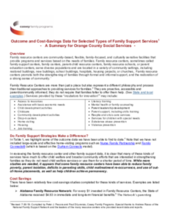Displaying 911 - 920 of 2221
A US federal appeals panel has ruled that "immigrant children detained by the U.S. government should get edible food, clean water, soap and toothpaste under a longstanding agreement over detention conditions," according to this article from the Associated Press.
In this opinion piece for Youth Today, Richard Wexler, executive director of the US National Coalition for Child Protection Reform, remarks on a few recent studies and findings that have indicated what many in the US child protection field already know: that social protection and anti-poverty programs improve child welfare outcomes and reduce child "neglect."
The purpose of this systematic review is to synthesize existing research on community- and home-based interventions designed to improve parenting and reduce risk of maltreatment for families with substance-exposed newborns (SENs), applying a program logic framework.
This study examined foster parent physical and mental health over time.
The purpose of this study was to describe the role of Public Health Nurses (PHN) addressing the needs of children and adolescents in foster care.
In this case study, the authors address a critical component of health care delivery for a vulnerable population by describing a process of developing an information sharing system between health care and child welfare organizations in collaboration with child protection community partners in the US.
The National Quality Improvement Center for Adoption and Guardianship Support and Preservation (QIC-AG) is a five-year project working with eight sites that will implement evidence-based interventions or develop and test promising practices which if proven effective can be replicated or adapted in other child welfare jurisdictions. This webinar presented learning from the project related to staffing and staff support, recruitment and retention, cost/sustainability, stakeholder collaboration, and logistics.
The primary aim of this study was to explore individual characteristics that could predict the quality of life and level of distress of foster care alumni.
This document from Casey Family Programs reviews data on Family Resource Centers and other family support services in the US.
This secondary analysis of data describing 3,035 parents, drawn from the National Survey of Child and Adolescent Well-Being II, identified factors fostering the collaborative alliance of parents and caseworkers within the child welfare system.

